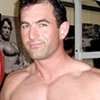The Olympia continues its expansion in 2013 to include the emerging Men's Physique competition. The category showcases aesthetic appeal, shape, symmetry, muscularity, and conditioning over extreme, shredded muscle.
The new category will create new champions for Joe Weider's Olympia Fitness and Performance Weekend. But who will win the inaugural physique title? There is no defending champ and the field is wide open, but one man possesses all the qualities needed to win the title.
Optimum Nutrition-sponsored athlete Steve Cook has the perfect body for men's physique. He stands 6-foot-1 and holds 210 pounds of well-conditioned muscle on a perfectly proportioned frame.
Steve has already won seven shows in two years on the circuit, including the 2012 IFBB Houston Pro. Cook's balanced physique and chiseled features have landed him multiple magazine covers and a growing army of fans—"Swoldier Nation," as he calls them.
Steve began his competitive career as a heavyweight bodybuilder, but quickly discovered that his tall and symmetrical frame was better suited to physique competition.
He won the 2010 Bodybuilding.com Fit Body Competition, which sparked a desire to further capitalize on his genetic gifts. He has honed an ultra-small waist, wide shoulders and full, round muscles.
Cook played football for Dixie State College (where he also earned a BS degree in Integrated Studies—biology/psychology). Now his training and nutritional approaches are designed to improve performance and maintain optimal health and wellbeing. He incorporates a range of training modalities and eats a balanced diet to stay in shape. His efforts have made him one of the hottest properties in male fitness modeling today.
Steve gradually refines his physique as an event draws near. For the Olympia, he must take it to an even greater level. Steve puts in the work, does all he can do to be at his best, and lets the results take care of themselves. At this year's Olympia Steve will be the one smiling, having fun, and letting his body do the talking.
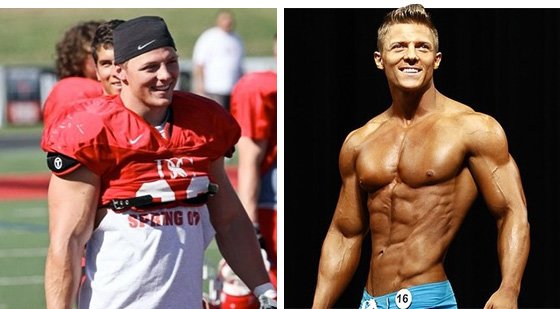
Q
How are you feeling on the eve of your first Mr. Olympia outing?
I feel good and have been putting in a lot of work. I haven't stepped onstage since last October, when I qualified [for the Olympia, at the 2012 Houston Pro] so I've had almost a whole year to sit back and watch other guys qualify and slowly and surely get more ready and excited for it all.
Do you think your time away from the stage has given you more determination to be at your best on Olympia day?
Definitely, it is always nice to have a good mental and physical break right after competing. When you diet and get ready for a show it's a strenuous thing. To have that break from competing has recharged my batteries and refreshed me mentally. I was able to have a good off-season. I'm excited and feel this is the best physique I have ever bought to the stage.
Have you made any changes to your training program specifically to ensure you are at your best at this year's Olympia?
Just having the time, having that off-season where I was able to lift a little heavier, has helped me. I was able to get back to some of the Olympic lifts and to what I had gotten away from for a while, which were the heavy compound movements. Those lend themselves to a more muscular physique overall, and better tie-ins from the top down.
If you are always doing isolation movements and getting ready for shows, it's hard to build muscle density. I feel like I was able to build that this time around.
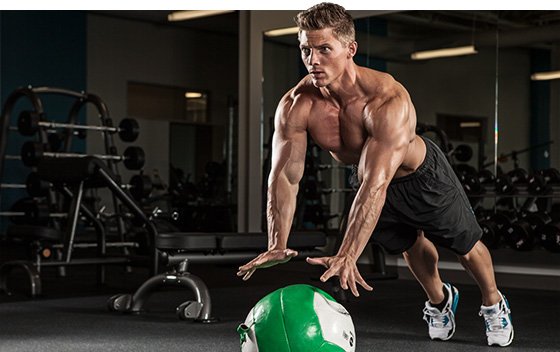
How would you describe your training style?
I hit everything twice each week: One session [for each area] has more in the way of compound movements and volume with longer rest periods; and later in the week it is higher volume, superset type stuff. I'm getting the best of both worlds and feel I'm really on my game. I'm a little ahead of schedule, so a week out I will be lean enough to step onstage.
This being the case, what strategy will you employ the final week before this year's Olympia, to ensure you maintain your muscular peak?
What I like to do a week before stepping onstage is to slowly refill, let my body rest and heal and fill back out. I'll include more calories and carbohydrates and then get onstage full, round, and feeling good. Sometimes I will be behind the eight ball and at these times I've had to push it right up to that last week before a show, just because I wasn't lean enough.
This time, because I was able to start far enough out, I've been able to do it slowly, retain muscle, practice my posing and just maintain that hunger and excitement—because it has been so long, and because it's the Olympia.
How have you implemented cardio in the lead-up to this year's Olympia?
Even in the off-season I included some cardio, whether it was CrossFit, lifting faster, or playing sports. I'm an athlete first and foremost, so it is important for me to have that cardiovascular endurance as well. But I don't go crazy with it. Right now I'm doing three 30-minute sessions per week of walking on a treadmill, and I'm doing one session of high-intensity sprints outside. Today was my off day from weights, so I sprinted. It is almost like another leg workout.
How long do your sprinting sessions last, and why do you incorporate sprinting as a training modality?
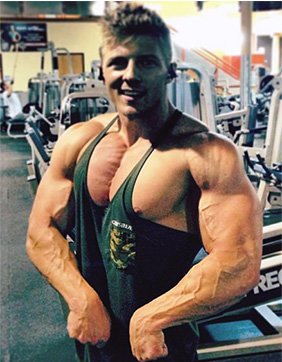
The whole workout itself is about 25-30 minutes. I do a warm-up and cool-down, and the sprints are about 30 seconds all-out. I rest a little between each.
Maybe it's because of my football background, but sprints are always something I have liked to do. They are so intense and work your lower back, hamstrings, glutes, and quads. I can't do them every day; that would just be too much for my central nervous system, especially when dieting.
But by incorporating them once per week, I still feel I get that post-oxidative burn and can stimulate all those muscle fibers.
Do you feel you are able to maintain your muscle fullness better with this high-intensity work?
Yes, I definitely think so. When I'm finished, my legs are full of blood. It's that post-oxidative effect, and now my mitochondria are burning more fuel for the rest of the day.
You are a big guy with an impressive structure. Would you ever be tempted to train for elite-level pro bodybuilding competition or are you content to continue competing as a physique pro?
I'm content. I'm almost 6-foot-1, and to compete in the pro bodybuilding ranks I would need to come in at around 250 pounds. I will come in onstage at this year's Olympia at around 205 pounds, so it's obviously a different look and it gives me more functionality year-round. There is nothing wrong with wanting to bodybuild. But for me, with my proportions, I think I look best at 205 in shape.
Even at 210 with 5 percent body fat I still maintain a good look. Steve Reeves is a good example: at 6-foot-1 he weighed 210 pounds and he was big into perfect proportions with his arms matching his calves and neck. That's more my speed. I respect what Jay [Cutler] and Phil [Heath] and those guys do, but it's not for me.
As a physique competitor, how must you modify your training and diet so as to develop a more aesthetic physique?
For my natural physique, I don't think I could get to 250 pounds without bulking up to 270. So first comes nutrition: eating enough to make slow gains without bulking excessively. Also, I rarely drop my reps below eight, so it's faster and even on my heavy days I'm max resting about 90 seconds.
My training is mostly hypertrophy-based and my diet is such that I don't pack on too many pounds. I think, as far as my genetic potential goes, it's not in the cards for me to ever get that heavy.
Can you outline your current diet?
I try to balance my nutrient intake. In the past I've tried to reduce a lot of foods almost to where I make all these rules for myself. My diet becomes very strict—no fruit or dairy, for example.
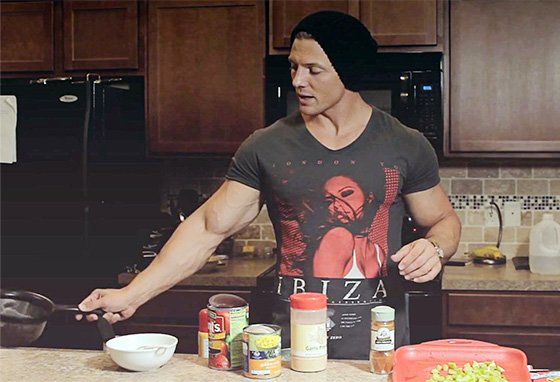
Now I'm not as restrictive. I make sure I get my macros for the day and keep track of my calories. But just for me, mentally, if I start making too many rules it removes the fun and I start developing unhealthy associations with food. For me, it has to be a lifestyle.
Even if I'm not competing, I want to eat healthy, so I don't restrict myself. I eat lots of veggies. I will remove dairy as I get closer to a show; it doesn't settle well with me. I also try to eat all hormone-free meats. I hate the terms "clean" and "dirty" in relation to food, but I do aim for foods that are nutrient-dense.
Which foods are off limits for you?
Anything with partially hydrogenated oils, and I'm not going to be eating Pop-Tarts any time soon. A lot of people now follow the "fit your macros" method and they can eat Hostess CupCakes if it's their carb day. I prefer to avoid processed sugars. There is more to food than just calories: You have the micronutrients, vitamins, and minerals.
If you begin starving your body of these you will begin noticing it in your physique; you won't feel as well and you won't be able to train as hard. That being said, I'm not going to be super strict 100 percent of the time.
We are all human and as such need balance. But I try to concentrate on the good things.
Do you schedule cheat days in the offseason?
I like to have balance even if I'm traveling. I will still have the occasional burger, but I don't like to call them cheat meals. That's the offseason though. At this time I'm burning a lot of calories and am very active. I will hike more and do things like CrossFit. Contest time is all about posing, working faster, and hitting all your numbers.
So in the offseason, I will lighten it up because I'm not trying to be 3.5 percent [body fat]. I keep my body fat around 7 percent or so.
How do you structure your supplementation?
I increase my supplement intake as I cut my calories pre-contest. I want to maximize my gym time. As with posing and lifting, I want to ensure I am leaving nothing to chance. I stay on creatine monohydrate all the way through to contest day to volumize my muscles. I will be lean, but I won't be dehydrated. I take a performance pack for multivitamins.
On heavy intense training days I will take a pre-workout supplement—[Optimum Nutrition] AmiN.O. Energy or Platinum Pre on those low carbohydrate days work great for me. I take essential fatty acids and fish oils and right now I'm also on L-carnitine and vitamin D. I also like beta-alanine and BCAAs.
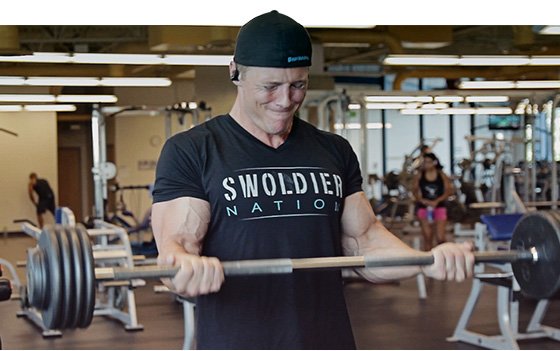
For the uninitiated, what are the main judging criteria you, as a physique competitor, must adhere to?
Bodybuilding is more objective: You step onstage and it is easier to see who is the biggest and who has the most muscle and is super striated and lean. With physique it is about being lean but not really dry. It's not about striations and cutting out water, but more to do with having round, full muscle bellies. I do not cut out water before a show because your muscles are, of course, 70 percent water. I focus on having good lines and being full.
Bodybuilders of the past, like Flex Wheeler, have also had this look. It's also important to have that tiny waist. You don't want to sacrifice proportion for size, whereas in bodybuilding you can sometimes get away with being a little thicker in the waist if you're the biggest competitor onstage.
In physique it is about having the balance between all the different body parts. A lot of physique guys don't realize that it is really important to be able to present your physique. In physique you must showcase what you have and present yourself in a way you think best; you don't have mandatory poses, for example.
What will set you apart from the other physique competitors at this year's Olympia?
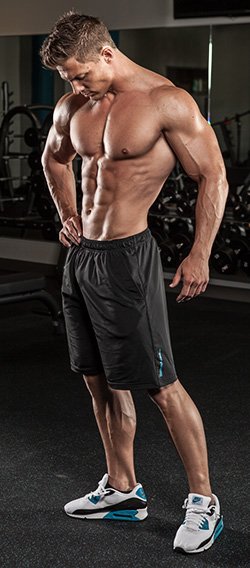
Everyone is going to come in looking great. My round, full muscles will definitely be an advantage. I was training with Charles Glass at the Mecca [Gold's Gym Venice] in 2012 and Robby Robinson told me before I stepped onstage that I had "the look." I am going to be confident out there. I have won most of the shows I've done and that is going to come across onstage.
In my head I've already pictured myself winning, so onstage it's just about me going out there and having fun. I have already put in the hours in the gym posing so it's just about getting out there and having a good time. And when the crowd is whistling and cheering it really gets me going. I feed off the crowd.
Do you have any predictions on where you might place at this year's Olympia, and why?
It's tough. I haven't stepped onstage for a while and I think there have been 10 or 11 pro shows in between so there will be a lot of good physiques, and I haven't competed against all of them.
As far as stage presence and the complete look, you can definitely count me in on being there at the end.
Is there ever a danger that you might enter a physique event too muscular?
Not necessarily for me, because I'm one of the bigger physique pros at more than 200 pounds onstage, but there are others who are shorter, and when you consider ratios and proportions they are heavier than me.
So though I'm big, with my height it's just where I need to be. There are some guys who have to worry about too much muscle, but I'm not one of them.
Is there anyone you would like to thank for helping you to be at your best as you approach Olympia day?
There are so many people who have helped me get to where I'm at today. One of the first people who helped me get ready for a show, Craig Toth, was big on getting me interested in this sport. Layne Norton has been one person I've looked up to for doing things healthy. I thank Allen Watkins for his guidance. I trained with Charles Glass for six months last year and he has always given me good feedback.
Thanks to Jim Manion for creating this division; and thanks to Bodybuilding.com, through which I won the 2010 Fit Body Competition and 2011 BodySpace Spokesmodel Search. Of course thanks to Optimum Nutrition, Six Pack Bags, and Swoldier Nation!

